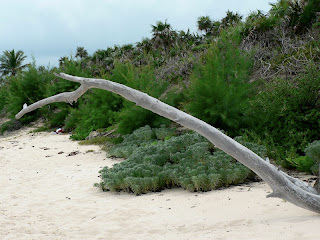Environmental Restorative Justice

This topic is a collision of two of my passions in life. First off, you probably know that I'm a nature nut. I love God's creation, all that he has created, I am connected with myself and with God when I'm in the natural world. That said, it's easy to deduce that I'm an environmentalist.
The second passion came a few years back, when I was in college, as I began discovering, as many young evangelical Christian now are, that God is VERY concerned with the oppressed, the poor, the disenfranchised and the sick. This was first an intellectual reality that forced me toward an action and different way of life. I still have a long way to go in my own life when it comes to understanding God's call for me and the Open Door toward restorative justice.
So, last week, when these two ideas collided I was excited. It was not that I had never thought of restorative justice and environmental justice being linked, I just hadn't experienced much in the way of bringing the two together in tangible ways. Two things happened in the Bahamas that made me realize that God is calling me toward action around these two passions. First, BJ and I did a learning experience with a PHD educated horticulturist working part time at a small farm in the Bahamas. Her and her fiance both believed that making decisions to eat locally grown food was a moral decision that would help local struggling farmers and the environment. We l
earned that buying locally grown food is more important from an environmental standpoint than buying certified organic food. Buying locally will cut carbon dioxide emission, the leading cause of global warming, because little shipment is needed. Just think how far an organic orange has to travel when you buy it in January and you live in Pittsburgh. Growing your own food is the best, especially when you do it organically. All summer long in Pittsburgh there are ample opportunities to buy locally grown food, even at places like Whole Foods, but especially at the farms and farmer's markets all around the city.
We also worked for a couple ours on a hurricane damaged beach to replant native sea grapes. We visibly saw the possible outcome of our work when we saw a huge sea bird sitting in one of the few trees left standing on the beach. Later that night we watched Andersen Cooper's Planet in Peril on CNN, which really makes the connection between environmental stewardship and the cause of the poor clear. If you've not seen the show yet, you must watch it.
Finally, one idea that is exciting me for our neighborhood...
It's quite clear that the good, healthy food being sold in our neighborhood is largely too expensive for anyone struggling financially. What does this mean? It means that many people in Garfield and East Liberty, while they have some of the most high end grocery stores in Pittsburgh within walking distance of their house, cannot afford to eat their healthy foods. So, why not start a small urban farm in Garfield, one of the most "abandoned" neighborhoods in the city, and sell the produce super cheap to Garfield residents. There are plenty of vacant lots all over the neighborhood to do this. Then, if there's enough produce after selling it in Garfield, connect with a local farmer's market and sell the rest at market prices. Maybe we could even make a dollar or two to support the O.D. This is something that the farm in the Bahamas is also trying to do. Of course this is a huge endeavor, but a dream is the only place to start.
The beach shown above is what a beach on the bahamas should look like. The one we were working on was far too close to the highway and largely emptied of sand and plant life.
Comments
I'll be back to visit...I'll have to read up on your church work...
xo,
SL
Recently Save a Lot opened a grocery store on Penn Avenue in WIlkinsburg. It is like an Aldi's but has more produce and regular stocked food. Ask everyone who shops in the upscale stores to try using Save A Lot instead. Support their efforts, it has been a long time since a grocery store has been in WIlkinsburg.
Saving the world one tomato at a time!